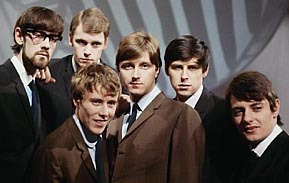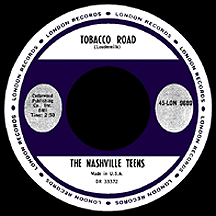THE NASHVILLE TEENS
Tobacco Road
"Tobacco Road" is a song about a love-hate relationship, not between human beings but concerning an actual place in Durham, North Carolina, singer-songwriter John D. Loudermilk's home town, famous for its "Bull Durham" tobacco industry. Morven's Place was a road named for the Morven Cotton Mill in Durham where Loudermilk delivered telegrams as a teenager in the 1940s. He recalled it was in a shoddy neighborhood where bootleg liquor was sold, gambling was common and there was even a "house of ill repute." The small lane off the main road leading to the mill was often referred to by the nickname "Tobacco Road."
Loudermilk built a fictional story in song around the setting, where '...mama died and my daddy got drunk...' and he made plans to eventually '...bring dynamite and a crane, blow it up, start all over again.' His original version was released on Columbia in early 1960 but wasn't a hit, yet the creative imagery of a place many people didn't realize existed sparked imaginations and led to many interpretations of the song by a variety of artists. Several versions, mostly country, were released over the next few years and a fall 1963 recording by Lou Rawls, while also not a hit, was closely associated with him through his bluesy live performances and is considered to be largely responsible for exposing Rawls to a national audience.
The song has since become a classic...obviously rooted in American culture, but with one wrinkle. The most famous version of "Tobacco Road" is by The Nashville Teens, a hit in the fall of 1964. But this act was not from Tennessee, or even the U.S.A., and the band's members had nearly all left their teenage years behind them by the time the song was released. Lead vocalist Arthur Sharp put the group together in Weybridge, located in Surrey County, England, and after a couple of shifts in the lineup, the 1964 Teens featured Ray Phillips on vocals and harmonica, John Hawkes on keyboards, lead guitartist John Allen, bassist Pete Shannon and drummer Barry Jenkins. Playing clubs in Hamburg, Germany, they backed Jerry Lee Lewis during a Eurpoean tour and were eventually spotted by producer Mickie Most. He helped them get a contract with Decca Records in the U.K. (London in the U.S.) and the unusual choice of "Tobacco Road," in its most rocking version yet, was the group's first release, making it to the top ten in England and top 20 in America.
Figuring Loudermilk's music was a winning formula, they stretched the boundaries of country and rock again with another of his down home ditties, "Google Eye." It returned them to the top ten in England but struggled in the States. The Teens made many television appearances at this time and performed in four movies released in 1965, most notably Pop Gear (in the U.S., the film's title was changed to Go Go Mania), a well-staged and impressively photographed color British film showcasing the first two singles. Months later they popped up as the only British act in Beach Ball, an American film starring Edd "Kookie" Byrnes and an impressive lineup of hot mid-'60s American acts.

The group's next two singles charted low in both countries: "Find My Way Back Home" was the last for London Records, as Mickie Most got them a deal with MGM (where he had successfully produced big hits for The Animals and Herman's Hermits). The first 45 for the new label was the Andrew Loog Oldham-produced "This Little Bird," another Loudermilk song, timed to compete with a release by Marianne Faithfull in the summer of '65, though it fell way short of her top 40 showing. No further releases generated much in sales or radio airplay, yet The Nashville Teens stayed active, minus Jenkins who defected to the Animals, the first of many changes in personnel over the years...which turned to decades. Founding member Art Sharp has continued as the leader of the group, which still performs and occasionally makes records.
As for the story John D. Loudermilk so descriptively delineated that first came to life as a country-pop song, "Tobacco Road" found new acceptance in rock circles, with psychedelic versions by Jefferson Airplane and Blues Magoos, an extended jam by Eric Burdon and War, and literally hundreds of other versions in nearly every conceivable musical genre.


